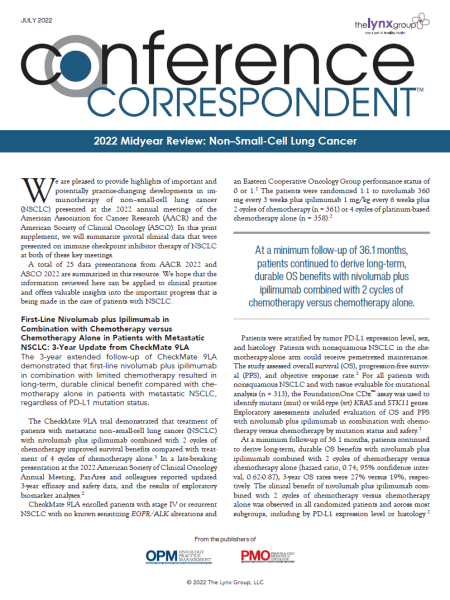Adjuvant osimertinib use results in clinically meaningful improvement in disease-free survival for patients with NSCLC who undergo surgery for early-stage disease.
Osimertinib (Tagrisso), a third-generation central nervous system–active EGFR-targeting tyrosine kinase inhibitor, is approved for use in patients with advanced NSCLC. ADAURA is a phase 3, double-blind, randomized study that assessed the efficacy and safety of osimertinib versus placebo in patients with stage IB to stage IIIA EGFR-mutated NSCLC after complete tumor resection and adjuvant chemotherapy when indicated.1 Following independent data monitoring committee recommendations, the trial was unblinded early due to efficacy.1 This report summarizes an unplanned interim data analysis.1
Eligible patients had to be aged ≥18 years (≥20 years in Japan and Taiwan); have a performance status of 0 or 1; primary nonsquamous stage IB, II, or IIIA NSCLC; confirmed EGFR mutation (either ex19del or L858R); and complete resection of primary NSCLC with full recovery from surgery.1 Postoperative chemotherapy was allowed. The maximum interval between surgery and study randomization was 10 weeks without adjuvant chemotherapy and 26 weeks with adjuvant chemotherapy.1
Patients were randomized to either osimertinib (80 mg orally once daily) or placebo and received treatment for up to 3 years.1 Patients were stratified by disease stage (IB, II, IIIA), mutation type (ex19del vs L858R), and race (Asian vs non-Asian).1 The primary end point of the study was disease-free survival (DFS) by investigator in stage II to IIIA patients. Secondary end points included OS and safety.1
In total, 682 patients were randomized to treatment: 339 to osimertinib and 343 to placebo.1 Baseline characteristics were balanced between the osimertinib and placebo arms: stage IB, 31% versus 31%, respectively; stage II or IIIA, 69% versus 69%, respectively; female, 68% versus 72%, respectively; ex19del, 55% versus 56%, respectively; and L858R, 45% versus 44%, respectively.1 Just over half (55%) of patients received adjuvant chemotherapy before study randomization.1
Among stage II and stage IIIA patients, the DFS HR was 0.17 in favor of osimertinib compared with placebo (95% CI, 0.12-0.23; P <.0001).1 The 2-year DFS rate was 90% with osimertinib compared with 44% with placebo.1 In the overall population, the DFS HR was 0.21 (95% CI, 0.16-0.28; P <.0001).1 The 2-year DFS rate was 89% with osimertinib compared with 53% with placebo.1 OS data were immature at the time of data cutoff.1 The safety profile of osimertinib was consistent with previous reports.1
Adjuvant osimertinib is the first targeted agent evaluated in a global trial that shows a statistically significant and clinically meaningful improvement in DFS in patients with stage IB, stage II, and stage IIIA EGFR-mutated NSCLC after complete tumor resection and adjuvant chemotherapy when indicated.1
Reference
1. Herbst RS, Tsuboi M, John T, et al. Osimertinib as adjuvant therapy in patients (pts) with stage IB-IIIA EGFR mutation positive (EGFRm) NSCLC after complete tumor resection: ADAURA. J Clin Oncol. 2020;38(18_suppl). Abstract LBA5.

